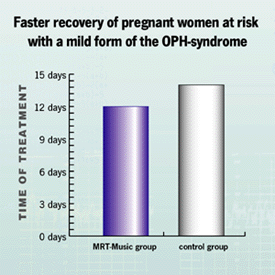With the help of a cardiotocogram the heart activity of the fetus was investigated.
The women were in the third trimester of pregnancy and suffered from a mild form of the OPH-syndrome (gestosis – nephropathy – with swellings at the feet, later at the whole body, hypertension, too much protein in urine) and the status of the fetal heart activity was problematic.
For 7-10 days 13 women with an average age of 26 years (±0,6) listened to the Medical Resonance Therapy Music® in the morning and after lunch and had no other therapy during these days.
The cardiotocogram documented in 86% of the investigations a normalization of the state of the fetus.
This was also subjectively confirmed by the pregnants who felt better and better. Already after the 6th sitting accelerations and variability of fetal heart beat had improved documenting an improved function of the fetal-placental system. Treatment could be ended after 12 days (±1) in this group.
14 women in this group received sedative and hypotensive drugs as well as a phytotherapeutic treatment.
The state of the fetus also normalized after 6 treatments with drugs, but it took on average 3-4 days longer before the normal state was reached. The mean duration of treatment in this group was 14 days (±2).
Investigators:
Prof. Dr. med. G. Gerassimowitsch
Prof. Dr. med. Walentina Sidorenko
Dr. med. Margarita Gawrisch
Dr. med. Tatjana Teterkina
Dr. med. Sergej Korotkow
